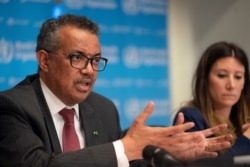India, France and Nigeria are among several countries whose leaders are extending lockdowns aimed at stopping the spread of the novel coronavirus, as the number of confirmed cases worldwide approaches 2 million.
With the number of infections in his country at close to 11000, Indian Prime Minister Narendra Modi announced Tuesday a nationwide lockdown would run through May 3.
French President Emmanuel Macron gave a late Monday televised address saying France’s lockdown would last through May 11, at which time authorities will begin to reopen schools.
“On the French mainland and in France's overseas territories, the system is under tension and the epidemic is not yet under control. We must therefore continue our efforts and continue to apply the rules. The more they are respected, the more lives will be saved,” he said.
Nigeria also is adding two more weeks to lockdown orders in Lagos, Abuja and Ogun, while Turkish President Recep Tayyip Erdogan said a 48-hour weekend lockdown would be repeated this week.
New Zealand ordered people to stay home three weeks ago, and while officials say it appears the country is past the peak of the virus, Prime Minister Jacinda Ardern said Tuesday that does not equal being out of danger.
"Most New Zealanders understand that now is not the time to let up. We must not squander the good work that everyone has put in over the last 20 days,” she said.
By far the most cases have been found in the United States, which accounts for close to 600,000 known infections, around one-third of confirmed cases worldwide, with the hardest-hit area being New York.
There are more than 106,700 cases in New York City and 195,000 cases in the entire state, more than Spain or Italy. But Governor Andrew Cuomo said Tuesday, “We think we are at the apex” one day after he and six other governors established a partnership to coordinate plans to reopen businesses.
After the coalition’s formation prompted President Donald Trump to declare Monday that he had “total” authority to determine when states could begin to reopen their economies, Cuomo said, “We don’t have a king in this country” and that attempts by Trump to apply federal authority over the states would trigger a “constitutional crisis.”
California was one of the earliest states to tell people to stay home. Governor Gavin Newsom plans to announce Tuesday his administration’s plans for starting to resume normal life.
Tuesday also brought small steps away from a total lockdown in Italy, which was allowing some shops to open again. The country has seen steadily improving numbers of critically ill patients after being a hotspot of the outbreak.
The pandemic has battered the world economy, with the International Monetary Fund projecting Tuesday the world economy would contract by 3% this year, the sharpest decline since the Great Recession of the 1930’s.
The global economic slowdown is leading many governments to enact massive rescue packages. U.N. Secretary-General Antonio Guterres has been among those pushing for help for poorer nations that need to focus limited resources on health responses.
The IMF gave its approval Monday to a $500-million effort to help 25 countries by canceling six months of their debt payments. Some of those nations include Afghanistan, Congo, Haiti, Mali, Sierra Leone and Yemen.
In the United States, part of the government’s plan to boost the flagging economy is sending cash payments to households to either help people cover their bills amid massive job losses, or to encourage people to spend money and boost business activity.
Those payments are in the process of being distributed, and Treasury Secretary Steven Mnuchin said he expects some 80 million Americans will have the funds in their bank accounts by Wednesday.
The World Health Organization’s director-general, Tedros Adhanom Ghebreyesus, has announced criteria for countries as they consider when and how to lift restrictions. Tedros said Monday the decisions “must be based first and foremost on protecting human health.”
They include countries ensuring that the transmission of the virus is controlled, that health systems can “isolate and treat every case and every contact” and that preventive measures are in place in essential places such as schools and workplaces.
Tedros also called on countries to ensure that risks can be managed and that communities are fully educated about the “new norm” in a post-coronavirus world.
Additionally, the director-general announced a new initiative “to flood the internet with facts and science while countering the growing scourge of misinformation, a poison that is putting even more lives at risk.”
He said, “Falsehoods are filling the airwaves” but that the world must unite against COVID-19 and “trust in science.” COVID-19 is the disease caused by the coronavirus.








